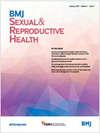Contraception in Iran: revolution and evolution
Q Medicine
Journal of Family Planning and Reproductive Health Care
Pub Date : 2016-12-22
DOI:10.1136/jfprhc-2016-101679
引用次数: 0
Abstract
In this journal issue, Erfani provides new data addressing likely effects of the current pronatalist policy in Iran. Using data from the 2014 Tehran Survey of Fertility, this international study estimates the likely impact of policy change on future fertility and service delivery. It is a study that exemplifies the value of collaboration between countries which share values on good governance relating to the right to health. Drawing on funding and research resources in both Iran and Canada, which is home to a significant Iranian diaspora, this study anticipates major effects from the reduction of free contraceptive services on both demographic indicators at the population level and quality of care at the individual level.1 These changes can best be appreciated against the background of Iran's excellent track record in providing contraceptive services. Family planning received international recognition in 1978 when it was included as a component of maternal and child health, and incorporated …伊朗的避孕:革命与演变
在本期杂志中,Erfani提供了新的数据,解决了伊朗目前的生育政策可能产生的影响。这项国际研究利用2014年德黑兰生育率调查的数据,估计了政策变化对未来生育率和服务提供的可能影响。这是一项研究,体现了在与健康权有关的善治方面有着共同价值观的国家之间合作的价值。这项研究利用伊朗和加拿大的资金和研究资源,这两个国家有大量的伊朗侨民,预计免费避孕服务的减少将对人口一级的人口指标和个人一级的护理质量产生重大影响在伊朗提供避孕服务的良好记录的背景下,可以最好地理解这些变化。1978年,计划生育作为妇幼保健的一个组成部分得到国际承认,并纳入…
本文章由计算机程序翻译,如有差异,请以英文原文为准。
求助全文
约1分钟内获得全文
求助全文
来源期刊

Journal of Family Planning and Reproductive Health Care
OBSTETRICS & GYNECOLOGY-
CiteScore
0.84
自引率
0.00%
发文量
0
审稿时长
>12 weeks
期刊介绍:
The trading of Professional, Managerial & Healthcare Publications Ltd has been transferred to its parent company, Keyways Publishing Ltd.
 求助内容:
求助内容: 应助结果提醒方式:
应助结果提醒方式:


